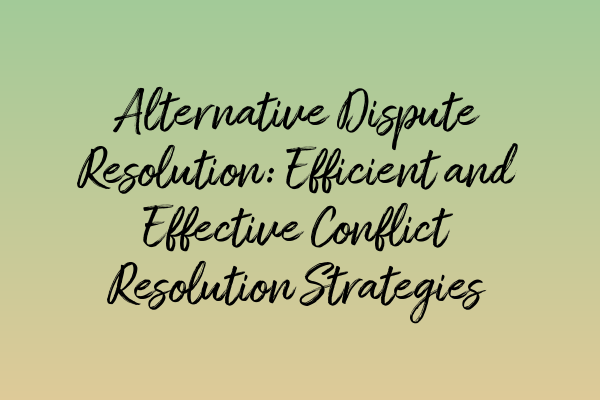Alternative Dispute Resolution: Efficient and Effective Conflict Resolution Strategies
When it comes to resolving conflicts and disputes, traditional litigation can be a lengthy and costly process. In today’s fast-paced world, parties involved in legal disputes are turning to alternative dispute resolution (ADR) as a more efficient and effective way to find mutually satisfactory solutions. In this blog post, we will explore the various strategies and benefits associated with ADR, and why it has become increasingly popular in modern legal practice.
Before we delve into the topic, it is essential to understand what ADR actually means. Alternative Dispute Resolution refers to any method of resolving legal conflicts outside of the traditional courtroom setting. ADR encompasses a range of processes, including negotiation, mediation, and arbitration, that provide parties with more control over the outcome and a faster resolution.
Let’s now take a closer look at the different types of ADR:
1. Negotiation:
Negotiation is a voluntary and informal process where parties try to reach a mutually acceptable agreement through direct communication and compromise. It is usually the first step in ADR and often leads to a resolution without the need for further intervention. Negotiation allows parties to avoid the exorbitant costs and time associated with litigation, making it an attractive option for many.
2. Mediation:
Mediation involves the assistance of a neutral third party, known as a mediator, who facilitates communication between the parties and helps them explore options for resolution. Mediation is a more structured form of ADR that focuses on finding common ground and fostering understanding between the parties. It encourages collaboration and paves the way for creative solutions that may not be available through litigation alone.
To learn more about the importance of mediation and how it works in legal practice, read our related article on The Role of Technology in Modern Legal Practice.
3. Arbitration:
Arbitration involves the submission of the dispute to an impartial arbitrator or a panel of arbitrators. Unlike mediation, where the mediator does not have decision-making authority, an arbitrator has the power to render a legally binding decision that is enforceable in court. Arbitration is often used in commercial disputes where parties prefer a private, confidential, and speedy resolution process.
For a closer look at the role of arbitration in legal education and practice, check out our informative article on A Closer Look at the Bar Professional Training Course (BPTC).
Now that we have explored the different forms of ADR, it’s important to highlight the advantages it offers compared to traditional litigation:
1. Cost-effective:
ADR processes are generally more cost-effective than litigation since they require fewer formalities, legal fees, and court expenses. Parties can save significant amounts of money by opting for ADR, making it an ideal choice for individuals and businesses seeking a more budget-friendly approach to dispute resolution.
2. Time-efficient:
Litigation can be a lengthy process due to court schedules, backlogs, and the complexity of legal procedures. ADR allows parties to bypass these delays and proceed with resolving their disputes in a timelier manner. Expedited resolution is particularly crucial when dealing with time-sensitive matters or business-related conflicts.
3. Confidentiality:
ADR proceedings are typically confidential, protecting the privacy and reputation of the parties involved. Confidentiality is often a significant concern in disputes where sensitive information needs to be shared, such as trade secrets or personal matters. Parties can feel more comfortable discussing their issues openly and honestly in a confidential ADR setting.
4. Control over the outcome:
Unlike litigation, where a judge or jury makes the final decision, ADR allows parties to maintain control over the outcome. This means they have a say in shaping the resolution, fostering a sense of ownership and satisfaction with the result. ADR empowers parties to craft solutions that are tailored to their specific needs and interests.
To get a more comprehensive understanding of the costs and financing options associated with a law degree, check out our article on Financing Your Law Degree: Understanding Costs and Options.
In conclusion, alternative dispute resolution methods offer efficient and effective strategies for conflict resolution. By choosing ADR over traditional litigation, parties can save time, money, and stress while maintaining control and privacy over the outcome. Whether through negotiation, mediation, or arbitration, ADR provides a more collaborative and flexible approach to resolving legal disputes.
For a deeper dive into the current legal industry trends and how they impact solicitors, read our informative article on Staying Ahead: Current Legal Industry Trends in the UK.
At Become Solicitor SRA, we understand the importance of staying ahead of industry developments and adopting effective conflict resolution strategies. Contact our team of experts to learn how we can help you navigate the world of alternative dispute resolution and achieve optimal outcomes for your legal matters.


Leave a Reply